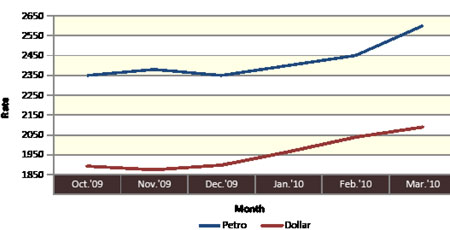
By Joan Akello
Dollar appreciation to blame
Fuel pump prices again edged up slightly last week at most stations in Kampala sparking fears of price volatility. The price of petrol rose by Shs 80 per litre over last week from Shs 2,520 to 2,600 at most stations.
The petrol price started rising in December for the first time since the first quarter of 2009. A litre of petrol was going for between Shs 2,420 and Shs 2,450 in February.Despite the current increase, however, the price are yet to hit the all time highs of 2009 when petrol spiralled to the Shs 2,600 mark and diesel and kerosene were at an average Shs 2,350 and Shs 2,200 respectively. By March 2009 the prices had settled at Shs 2450, Shs 1,870, and Shs 1,800 for petrol, diesel, and kerosene respectively. These price levels have remained almost steady until recently.
Dealers attributed the current rise in prices mainly to the appreciation of the US dollar against the shilling.
Shell Uganda Chairman Ivan Kyayonka said, “Petrol prices are increasing due to the exchange rate mainly and the international oil prices”. The petroleum products are purchased in dollars. Therefore the low purchasing power of the shilling has increased the price of petrol, diesel kerosene and other products. A supervisor at Shell Kira road said, “A change in the dollar value automatically affects the petrol prices. They either increase or fall”.
The dollar which was trading in the Shs 1,890 range in December 2009 when it started appreciating crossed the Shs 2,000 mark in mid-February. It was trading in the Shs 2,070 range moving into the Shs 2,080 range most of last week at most forex bureaus in Kampala.

According to Richard Jjuuko, assistant manager at Total Bukoto, it is not solely the high dollar value that has increased the prices. Other factors include scarcity, the close location of the petrol stations, large market size and the taxes levied on the products at Mombasa port.
“When Shell Kira Road increases its prices, Total Bukoto does likewise,” he said.
As a result, the petrol prices are almost the same due to the proximity of many petrol stations in places like Nakulabye where Shell, Total, GAPCO are very close to each other. Competition checks on the pricing.
Although the competitors are confident of their customers”™ loyalty despite the high prices, a supervisor at Shell Kira Road said that the customers are sensitive and are purchasing less fuel. He said that the day sales indicate the reduction especially in petrol.
Some smaller stations are offering slightly lower prices but the main dealers say this is evidence of the existence of a fuel black market. One dealer said the lower prices might be an indicator that the measurement used is not standard.
At Shell Kira Road, from March, 9, the price of petrol, diesel and kerosene increased from Shs 2,400 to Shs 2,600, Shs 2,050 to Shs 2,200 and from Shs 1,700 to Shs 1,800 respectively in the week ending March 8.
Sector players said they could not predict the future price trends.
“The prices vary. I cannot establish the extent of the price increase,” said Kyayonka, who is also the president of petrol dealers in Uganda. He said pricing will continue to vary from one petrol station to another and will depend on the exchange value of the shilling.
Fuel dealers say in times like these smart consumers either use public transport where possible, ensure that their vehicle engines are well service to ensure fuel efficiency, switch off engines if they are not driving, or use vehicles with low cubic capacity preferably those between 1300 “” 1800 cc to reduce on consumption.
 The Independent Uganda: You get the Truth we Pay the Price
The Independent Uganda: You get the Truth we Pay the Price


